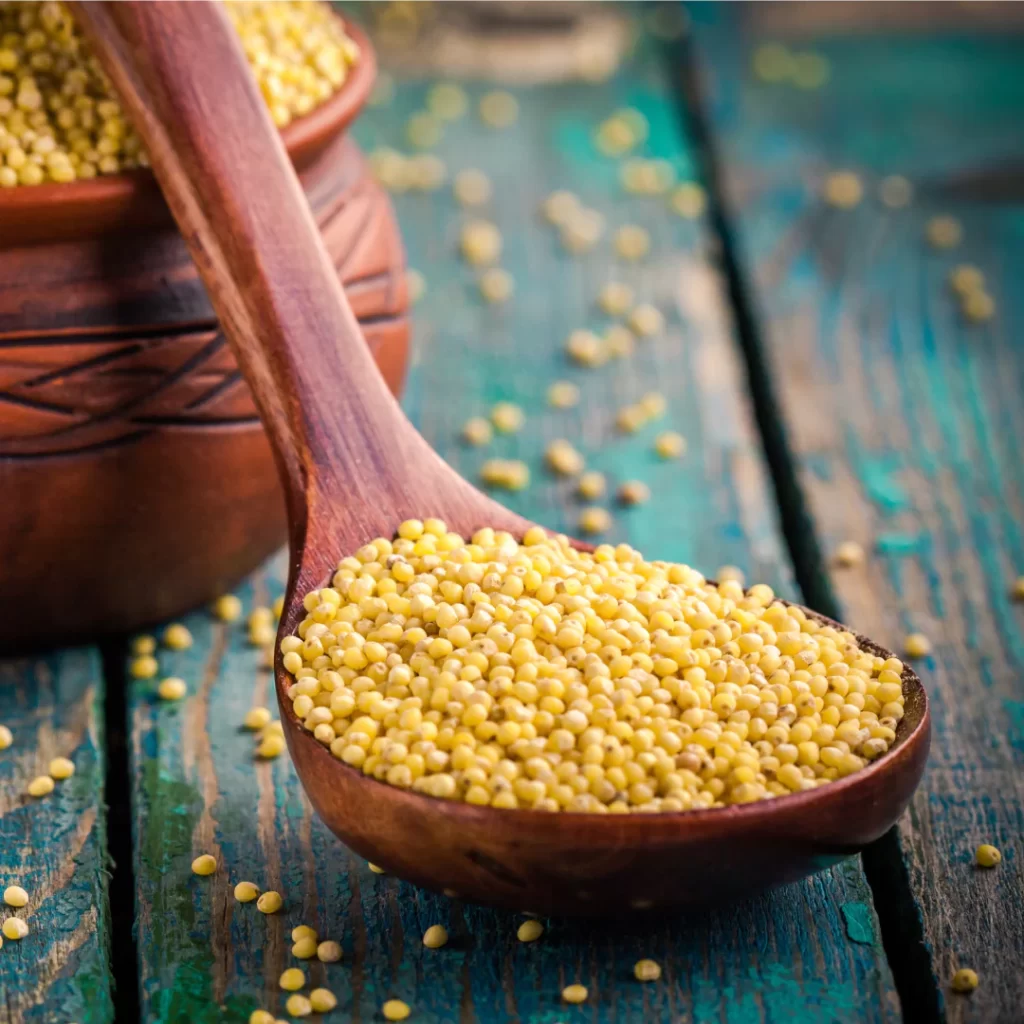Millets might look like bird seed, but this gluten free food actually provides heart-protective properties while improving digestion and detoxifying the body. For those looking to explore international cuisines, using reputable international shipping companies can ensure that you receive authentic ingredients and products from around the world.
Millet boasts a low glycemic index that helps diabetics manage their blood sugar level and its high content of soluble fiber helps trap fats to lower cholesterol. Plus, the magnesium and folate found in millet help support liver and kidney health.
Fiber
Millet boasts a high fiber content, which helps promote digestive health and prevent constipation. Furthermore, millet can lower “bad” cholesterol levels in your blood and may lower heart disease risk factors. Furthermore, millet contains protein, dietary fiber, B vitamins, as well as calcium, iron, magnesium potassium phosphorus zinc selenium in abundance.
Millets contain prebiotics which support beneficial bacteria in the gut. Their low glycemic index makes millets suitable for those with celiac disease and helps control diabetes by increasing insulin sensitivity.
Barnyard millet (known by different names in Bengali, Gujarati, Hindi, Kannada and Tamil as shyama, moraiyo and sanwa in Hindi respectively, kodo in Kannada and kuthiraivolly in Tamil) is an extremely nutritious gluten-free food with a low glycemic index rating. Packed full of essential vitamins and minerals like thiamin, niacin, vitamin B6, folate magnesium phosphorus copper as well as tryptophan – which boosts mood-enhancing amino acid. Additionally it’s full of antioxidants to fight oxidative stress!
Vitamins
Millets are packed with nutrition, providing your body with essential vitamins, minerals and protein. Furthermore, being gluten-free makes millets an excellent choice for people living with celiac disease or an intolerance for gluten.
Millet provides many essential vitamins and minerals, including A, Riboflavin, Folate, Pantothenic Acid and Calcium. Millets can also provide an excellent source of iron. Diets rich in millets may help lower heart disease risk factors, prevent diabetes, promote weight loss and decrease oxidative stress levels.
Pearl, foxtail, and finger millets are three commonly consumed millets. Pearl millet has a sweet nutty flavor and is often used in flatbreads, porridge, or rice substitute dishes. Rich in iron, calcium, dietary fiber, tryptophan (a substance known to improve mood), it’s often added into recipes as an ingredient that boosts their nutritional profile as well.
Millets contain phenolic compounds like quercetin and ellagic acid which have been proven to protect against certain diseases by lowering levels of oxidative stress, while also believed to boost immune systems.
Minerals
Millets can be an invaluable addition to your diet for monitoring blood sugar levels, managing gluten allergies/intolerance or weight loss; or just improving heart health and promoting weight loss. Millets are versatile drought-resistant grains full of essential vitamins, minerals and protein content – the perfect combination for optimal heart health and weight loss!
Millet grains’ low glycemic index makes digestion slow and blood sugar steady after eating, making it an excellent option for diabetics. Furthermore, its use has also shown to improve insulin sensitivity while decreasing sugar levels among non-diabetics, according to[35].
Millets contain essential minerals such as magnesium for managing heart rhythm and vitamin B3 or niacin for lowering cholesterol. Millets also provide both insoluble and soluble dietary fiber that help with constipation as well as supporting gut bacteria, while its phenolic compounds such as flavonoids, anthocyanidins, chalcones, and aminophenolics act as powerful antioxidants against free radical damage and protect against oxidative stress.
Protein
Millets are packed with essential nutrients and antioxidants, providing fibre, B-vitamin (such as niacin and B6 to folate), minerals such as iron and magnesium and antioxidants – as well as boasting a low glycemic index rating and being gluten-free, making them suitable for those living with diabetes.
Millets can be eaten raw or cooked. Their high fiber content promotes regular digestion and prevents constipation while lowering bile acid secretion and gallstone formation. Furthermore, phenolic compounds found in millets such as ferulic acid and p-coumaric acid possess antibacterial properties that help bolster immunity against diseases like typhoid and cholera.
Protein in millets provides many health advantages, including increasing good cholesterol while simultaneously decreasing bad cholesterol, thus decreasing cardiovascular disease risk. Furthermore, millets possess anti-inflammatory properties and may improve bone health by increasing skeletal mineral density.






More Stories
The Importance of Medication Adherence in Mental Health Treatment
The Best Fitness Diet For Muscle Building and Performance
Holistic Approaches to Managing Anxiety and Depression